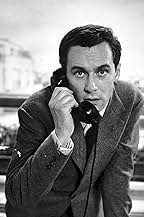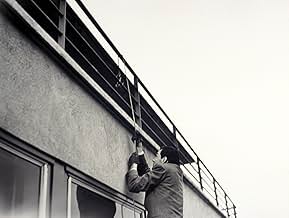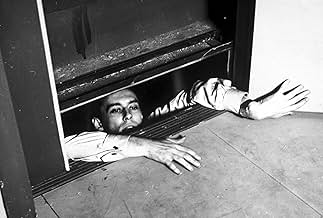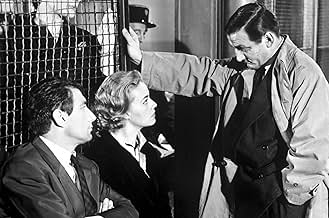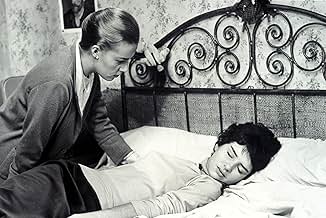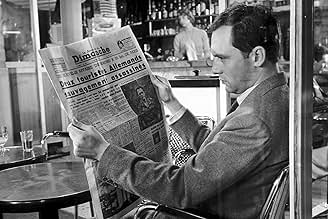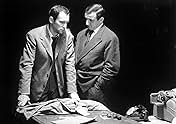Florence e Julien decidem matar Simon, o marido de Florence. O crime deve parecer suicídio. Como é tarde, o vigia corta a eletricidade: Julien fica preso no elevador. Enquanto isso, dois jov... Ler tudoFlorence e Julien decidem matar Simon, o marido de Florence. O crime deve parecer suicídio. Como é tarde, o vigia corta a eletricidade: Julien fica preso no elevador. Enquanto isso, dois jovens roubam o carro de Julien.Florence e Julien decidem matar Simon, o marido de Florence. O crime deve parecer suicídio. Como é tarde, o vigia corta a eletricidade: Julien fica preso no elevador. Enquanto isso, dois jovens roubam o carro de Julien.
- Direção
- Roteiristas
- Artistas
- Prêmios
- 1 vitória no total
Avaliações em destaque
Meanwhile the smalltime thief Louis (Georges Poujouly) steals Julien's car and drives to a motel with his girlfriend Véronique (Yori Bertin) and lodge using the name of Julien. They drink with the German tourists Horst Bencker (Iván Petrovich) and his wife Frieda Bencker (Elga Andersen) and early in the morning, Louis tries to steal his Mercedes Benz. When he is surprised by Horst, Louis shots and kills the couple. Julien Tavernier becomes the prime suspect of the murder and when he leaves the lift, he does not have alibi for the murder of Simon Carala and the German tourists.
"Ascenseur pour l'Échafaud" is the first feature of Louis Malle, who is also one of the writers. The unpredictable and original story is fantastic, the screenplay has many plot points until the very last scene and the performances are top-notch.
Julien Tavernier is a methodic military with cold blood that gets caught between the rock and a hard place due to a mistake and lots of bad luck. The soundtrack with the music of Miles Davis gives a touch of class to this little masterpiece. The result is one of the best thrillers entwined with comedy of errors that I have ever seen. My vote is nine.
Title (Brazil): "Ascensor Para o Cadafalso" ("Elevator to the Gallows")
The trouble is the material itself is better suited to Hollywood B-movie techniques. In short, the material is jagged, while Malle's style is smooth, resulting unfortunately in a thriller drained of inherent drama. Note, for example, the elevator sequence, a predicament fairly bursting with suspenseful potential. Yet Malle's style does little to heighten the implicit desperation and even cuts away (though smoothly) from the mounting tension. To be fair, Ronet (Tavernier) adds nothing by remaining impassive throughout. (Perhaps paratroopers never sweat.) Thus the movie's dramatic centerpiece flattens out into just one more event among many.
Then there are the various misadventures of the free-spirited kids. They look cuddly, but remain amoral cyphers throughout, their double homicide coming across again as just one more event, no more important than Florence's (Moreau) dispirited walk up the avenue. In fact, the one time Malle highlights with his camera is that lengthy trudge through Paris, a director clearly fascinated by Moreau's distinctive appearance. Again, the style is smooth and polished, but also highly impersonal and homogenizing. I kept wishing one of Hollywood's noir masters like Nicholas Ray or Billy Wilder had gotten hold of the material first.
No need to go on apart from Malle about a sloppy script with its number of plot holes helpfully cited by other reviewers, or about overlooked details like a bullet to the head that raises no blood. All in all, I wonder how many folks would celebrate the film if it were not from France with Malle's name on it. Apart from its influence on French cinema, the movie does not wear well over time. Moreover, given the style he shows here, it's no surprise to me that Malle's breakthrough movie would be titled The Lovers rather than this over-civilized slice of thick ear.
A little ole devil this one, a sly slow pacer that itches away at your skin. Rightly seen as a bridging movie between the classic film noir cycle and the nouvelle vague, Malle's movie is in truth straightforward on narrative terms. Julien Tavernier (Ronet) is going to kill husband of his lover, Florence Carala (Moreau), who also happens to be his boss, but upon executing the perfect murder, he, through his own absent mindedness, winds up stuck in a lift close to the crime scene. Outside Florence is frantically awaiting his arrival so as to begin their life together in earnest, but when a couple of young lovers steal Julien's car, Florence gets the wrong end of the stick and a sequence of events lead to Julien and Florence hitching that ride to the gallows.
Simplicity of narrative be damned, Malle's movie is a classic case of that mattering not one jot. There is style to burn here, with bleak atmospherics dripping from every frame, and Miles Davis' sultry jazz music hovers over proceedings like a sleazy grim reaper. The ironic twists in the writing come straight off the bus to noirville, putting stings in the tale, the smart reverse of the norm finding Moreau (sensual) wandering the streets looking for her male lover, while elsewhere he's in isolation and a doppleganger murder scenario is cunningly being played out. Decaë's photography has a moody desperation about it that so fits the story, the use of natural light making fellow French film makers sit up and take notice. While the dialogue, and the caustic aside to arms dealings, ensures we know that Malle can be a sly old fox. He really should have done more noir like pictures.
A film that convinces us that Julien and Florence are deeply in love and passionate about each other, and yet they never are once together in the whole movie! It's just one of the many wonderful things about Louis Malle's excellent picture.
Remember folks, the camera never lies... 9/10
Malle pays tribute to the tense murder style of Hitchcock with Billy Wilder's cynicism of selfishness a la "Double Indemnity" plus Graham Greene-like, post-war politics from "The Third Man"-- and arms and oil dealers with military pasts in the Middle East are not outdated let alone adulterous lovers and rebellious teenagers.
The film drips with sex and violence without actually showing either -- sensuous Jeanne Moreau walking through a long, rainy Paris night is enough to incite both.
The black and white cinematography by Henri Decaë is breathtakingly beautiful in this newly struck 35 mm print, from smokey cafés with ever watchful eyes like ours to the titular, ironic alibi's long shafts (which surely must have inspired a key, far paler scene in "Speed") to highway lights, to a spare interrogation box, but particularly in the street scenes. The coincidences and clues are built up, step by step, visually, including the final damning evidence.
Miles Davis's improvisations gloriously and agitatedly burst forth as if pouring from the cafés and radios, but the bulk of the film is startlingly silent, except for ambient sounds like rain that adds to the tension in the plot.
The characters are archetypes -- the steely ex-Legonnaire, the James Dean and Natalie Wood imitators, the preening prosecutor -- that fit together in a marvelous puzzle. But all are cool besides Moreau's fire, as she dominates the look of the film, just wandering around Paris.
There is some dialog that doesn't quite make sense at the end, but, heck, neither does "The Big Sleep" and this is at least in that league, if not higher in the pantheon.
Jeanne Moreau is the perfect pouty French femme fatale. Her scenes of walking (wandering) the dark, rainy streets of Paris are chilling to watch for film lovers. The weak lighting and lack of make-up allow Moreau's true emotions to guide us. Malle also is tremendous in his filming of the elevator scenes with Maurice Ronet.
The secondary characters of the young lovers played by Yori Bertin (Veronique) and George Poujouly (Louis) are unmistakable in their likeness to Natalie Wood and James Dean. Watching two young kids carelessly destroy their own lives, as well as that of others, is quite the contrast to the well-conceived scheme of Moreau and Ronet.
I have not been able to come up with an apt description of the powerfully improvised jazz score from the legendary Miles Davis. The approach has been mimicked over the years, but never duplicated. It is startling in its ability to slap the viewer in the face! Moreau is of course a screen legend and went on to star in "Jules and Jim", Truffaut's "The Four Hundred Blows" and my personal favorite, "The Bride Wore Black". As great as she was in all of these, I am not sure her essence was ever better captured than her wandering through the Paris streets in "Elevator to the Gallows".
Você sabia?
- CuriosidadesMiles Davis recorded the music in a single recording session while he watched a screening. He composed it while watching a rough cut and then invited a quartet of French and US musicians in a for few hours (from 11pm to 5am one night), improvising each number and allegedly sipping champagne with Jeanne Moreau and Louis Malle.
- Erros de gravaçãoWhen Florence arrives at the motel, the photos are just being developed - with the lights on! Exposing the prints to light before fixation would make them turn black. By the way, it's not recommended to put your hands into developer.
- Citações
Julien Tavernier: Don't sneer at war. It's your bread and butter. Indochina netted you how much? And now Algeria. Have some respect for war. It's your family heirloom.
- Trilhas sonorasAscenseur Pour L'Échafaud (Générique)
Composed by Miles Davis
Performed by Miles Davis (Trumpet), Barney Wilen (Tenor Saxophone), Emilhenco (as René Urtreger) (Piano), Pierre Michelot (Bass) and Kenny Clarke (Drums)
Principais escolhas
- How long is Elevator to the Gallows?Fornecido pela Alexa
Detalhes
- Data de lançamento
- País de origem
- Centrais de atendimento oficiais
- Idiomas
- Também conhecido como
- Elevator to the Gallows
- Locações de filme
- 26 Rue de Courcelles, Paris 8, Paris, França(Tavernier climbing on the upper terrace)
- Empresa de produção
- Consulte mais créditos da empresa na IMDbPro
Bilheteria
- Faturamento bruto nos EUA e Canadá
- US$ 374.671
- Fim de semana de estreia nos EUA e Canadá
- US$ 7.354
- 26 de jun. de 2005
- Faturamento bruto mundial
- US$ 431.784
- Tempo de duração1 hora 31 minutos
- Cor
- Proporção
- 1.66 : 1


